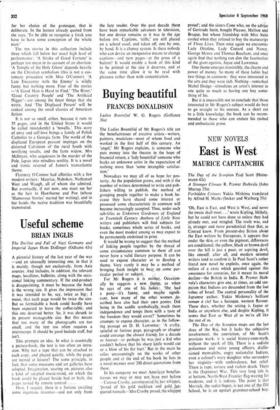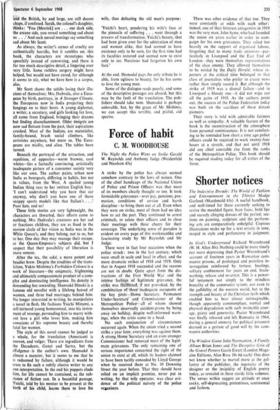NEW NOVELS
East is West
MAURICE CAPITANCHIK
A Stronger Climate R. Prawer Jhabvala, (John Murray 25s) Forbidden Colours Yukio Mishima translated by Alfred H. Marks (Seeker and Warburg 35s) `Oh, East is East, and West is West, and never the twain shall meet ...' wrote Kipling, blithely, but he could not have done so unless they had already met, and mingled. The truth was, and is, stranger and more paradoxical than that, as Conrad knew. From present-day fiction about the East written by Europeans, it appears that under the skin, or even the pigment, differences are conditional; the yellow, black or brown devil over the hill is just a poor, or aspiring, devil, like oneself, after all, and modern oriental writers tend to confirm it. In Paul Scott's rather literal new novel he exploits, once again, the milieu of a caste which guarded against this awareness for centuries, for it meant its moral decline—the British in India. R. Prawer Jhab- vala's characters give one, at times, an odd sus- picion that Indians are descended from the lost tribes of Israel. The central personality of the Japanese author, Yukio Mishima's brilliant roman a clef has a baroque, western flavour. These days, whether the setting is Japan or India or anywhere else, and despite Kipling, it seems that East or West of us we're all like the rest of us.
The Day of the Scorpion maps out the last days of the Raj, but it lacks the subjective involvement, the conviction, of Mr Scott's previous work; it is social history-cum-myth, without the spark of life. There is a sadistic policeman and naïve young officers, disillu- sioned memsahibs, angry nationalist Indians, even a colonel's wary daughter who surrenders her virginity—with ambivalence, but relief. There is rape, torture and violent death. There is, the (Japanese) War. This very long tale is, at bottom, North-West Frontier flag-waying for moderns, and it is tedious. The point is that Merrick, the sadist-Super, is net one of the Old School, he is an upstart grammar-school boy, and the British, by and large, are still decent chaps, if confused. Sarah, the colonel's daughter, thinks : 'You [Merrick] are . . . our dark side, The arcane side, you reveal something sad about us . . .' And such unreal musings say something sad about Mr Scott.
As always, the writer's scenes of cruelty are authentically horrific, but it rambles on, this book, the characters are stereotypes who speechify instead of conversing, and there is far too much descriptive detail, a lingering over very little. Some ruthless surgery might have helped, but would not have cured, for although it seems to stir, what we have here is a corpse, alas.
Mr Scott shows the sahibs losing their illu- sions of themselves; Mrs Jhabvala, also a Euro- pean by birth, portrays, in A Stronger Climate, the Europeans now in India projecting their longings on to their hosts. A young diplomat, a writer, a secretary, and girls looking for love, all come from England, bringing their dreams but finding disenchantment. Older émigrés are now sad flotsam from the past, their aspirations crushed. Most of the Indians are materialist, family-bound, brash social climbers, like arrivistes anywhere, but more so. The Euro- peans are misfits, and alien. The tables have turned.
Beneath the portrayal of the attraction, and repulsion, of opposites—warm browns, cool whites—lies a factually convincing, artistically inadequate picture of a consumer society very like our own. The author paints urban new India as bourgeois, differing in habits, but not in values, from the West. A spoiled young Indian thing says to her smitten English boy: `I can't understand why you have that car anyway, why don't you have one of those snappy sports models like that Italian's . . Poor him, and us!
These little stories are very lightweight, the characters are thwarted, their efforts come to nothing. Mrs Jhabvala's creatures are her sad or fractious children, they are as fixed in the narrow circle of her vision as India was in the White Queen's, and they belong, not to us, but to her. One day they may manage their escape, as the Queen-Empress's subjects did, but I suspect that their possibility of liberation is more remote.
After the tea, the sake, a more potent and headier brew. Despite the crudities of the trans- Yukio Mishima's Forbidden Colours is a work of literature:—the enigmatic, frightening and ultimately compassionate product of a com- plex and dominating intelligence. Its density is demanding but rewarding. Shunsuke Hinoki is a famous old novelist with a lifelong hatred of women, and three bad marriages behind him. NO longer interested in writing, he manipulates a novel in flesh. He fashions Yuichi Minumi, a self-tortured young homosexual, into his instru- ment of revenge, persuading him to marry with- out love a girl who loves him, making him conscious of his supreme beauty and thereby fatal for women.
The style of this novel cannot be judged as
a whole, for the translation (American) is uneven, and vulgar. There are ingredients from the Decadents, Genet and Sartre, but the effulgence - is the author's own. Shunsuke is almost a monster, but it seems to me that he is redeemed by failure, although it would be crass to fix such a subtly elusive writer to any one interpretation. In the end his puppets elude bim, for life cannot be contained, as the sub- stance of fiction can. In a beautiful passage, Yuichi, told by his mentor to be present at the birth of his child, learns there to love his
wife, • thus defeating the old man's purpose: 'Yuichi's heart, pondering his wife's face at the pinnacle of suffering . . . went through a process of transformation. Yuichi's beauty, that had been given over for the admiration of man and woman alike, that had seemed to have existence only to be seen, for the first time had its faculties restored and seemed now to exist only to see. Narcissus had forgotten his own face.'
At the end, Shunsuke pays the only tribute he is able, from ugliness to beauty, for he has come to love the young man.
Some of the dialogue reads poorly, and some of the descriptive passages are absurd, but this may be the fault of the translation. The pub- lishers should take note. Shunsuke is perhaps unlovable, but, by the grace of Mr Mishima, we can accept this terrible, and pitiful, old spectre.







































 Previous page
Previous page